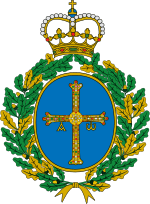John Elliott (historian)
Sir John Huxtable Elliott, FBA (born 23 June 1930), is a British historian, Regius Professor Emeritus at the University of Oxford and Honorary Fellow of Oriel College, Oxford and Trinity College, Cambridge.[1] He publishes under the name J.H. Elliott.
Sir John Elliott | |
|---|---|
| Born | John Huxtable Elliott 23 June 1930 |
| Nationality | British |
| Alma mater | Cambridge |
| Occupation | Historian |
| Known for | Works on the history of Spain and the Spanish Empire in the early modern period |
| Title | Regius Professor of Modern History |
| Term | 1990–1997 |
| Predecessor | Michael Howard |
| Successor | Robert Evans |
Biography
Born in Reading, Berkshire, Elliott was educated at Eton College and Trinity College, Cambridge. He was an assistant lecturer at Cambridge University from 1957 to 1962 and Lecturer in History from 1962 until 1967, and was subsequently Professor of History at King's College, London between 1968 and 1973. In 1972 he was elected to the Fellowship of the British Academy. Elliott was Professor in the School of Historical Studies at the Institute for Advanced Study, Princeton, New Jersey from 1973 to 1990, and was Regius Professor of Modern History, Oxford between 1990 and 1997.[2][3][4]
He holds honorary doctorates from the Autonomous University of Madrid (1983), the universities of Genoa (1992), Portsmouth (1993), Barcelona (1994), Warwick (1995), Brown University (1996), Valencia (1998), Lleida (1999), Complutense University of Madrid (2003), College of William & Mary (2005), London (2007), Charles III University of Madrid (2008), Seville (2011), Alcalá (2012), and Cambridge (2013).[3] Elliott is a Fellow of the Rothermere American Institute, University of Oxford, of whose Founding Council he was also a member.[5]
Elliott was knighted in the 1994 New Year Honours for services to history[6] and was decorated with Commander of Isabella the Catholic in 1987, the Grand Cross of Alfonso the Wise in 1988, the Grand Cross of Isabella the Catholic in 1996, and the Creu de Sant Jordi in 1999. An eminent Hispanist, he was given the Prince of Asturias Prize in 1996 for his contributions to the Social sciences. For his outstanding contributions to the history of Spain and the Spanish Empire in the early modern period, Elliott was awarded the Balzan Prize for History, 1500–1800, in 1999.[3] He has been a corresponding member of the Real Academia de la Historia since 1965.[7]
His studies of the Iberian Peninsula and the Spanish Empire helped the understanding of the problems confronting 16th- and 17th-century Spain, and the attempts of its leaders to avert its decline.[8] He is considered, together with Raymond Carr and Angus Mackay, a major figure in developing Spanish historiography.[9]
Elliott's principal publications are The Revolt of the Catalans (1963); The Old World and the New, 1492–1650 (1970); and The Count-Duke of Olivares (1986).[4] His Richelieu and Olivares (1987) won the Leo Gershoy Award of the American Historical Association[10] and, in 1992, the Prize XVIIe. In 2006, his book Empires of the Atlantic World: Britain and Spain in America 1492–1830 was published by Yale University Press, winning the Francis Parkman Prize the following year. In 2012 he published his reflections on the progress of historical scholarship; History in the Making.[4]
Works
- The Revolt of the Catalans: A Study in the Decline of Spain, 1598–1640 (Cambridge University Press, 1963; pbk reprint, 1984)
- Imperial Spain: 1469–1716 (London 1963, revised repr. Penguin Books, 2002)
- Europe Divided, 1559–1598 (London 1963; revised repr. 2002)
- The Old World and The New 1492-1650. (Cambridge University Press, 1970; pbk reprint, 1992)
- Memoriales y cartas del Conde-Duque de Olivares, 2 vols. (with José F. de la Peña) (Madrid 1978–81)
- Richelieu and Olivares. (Cambridge University Press, 1984; pbk reprint, 1989)
- The Count-Duke Olivares: The Statesman in an Age of Decline (Yale University Press 1986)
- Spain and Its World, 1500–1700: Selected Essays (Yale University Press, 1989)
- The World of the Favourite (edited, with L.W.B. Brockliss) (Yale University Press, 1999)
- The Sale of the Century: Artistic Relations between Spain and Great Britain, 1604–1655 (with Jonathan Brown) (Yale University Press 2002)
- A Palace for a King – with Jonathan Brown (Yale University Press, 2003)
- Empires of the Atlantic World: Britain and Spain, 1492–1830 (Yale University Press, 2006)
- Spain, Europe and the Wider World, 1500–1800 (Yale University Press, 2009)
- History in the Making (Yale University Press, 2012)
- Scots and Catalans: Union and Disunion (Yale University Press, 2018)
References
- "Honorary Fellows of Trinity College, Cambridge". Retrieved 26 January 2007.
- "No. 52199". The London Gazette. 2 July 1990. p. 11319.
- "Debrett's People of Today entry for Prof Sir John Elliott, FBA". Archived from the original on 11 November 2014. Retrieved 26 October 2014.
- "British Academy Fellows Archive. Record for: ELLIOTT, Sir John". Archived from the original on 26 October 2014. Retrieved 26 January 2007.
- "The Rothermere American Institute Founding Council". Rothermere American Institute. Archived from the original on 17 November 2012. Retrieved 22 November 2012.
- "No. 53527". The London Gazette. 30 December 1993. p. 1.
- "El historiador británico John H. Elliott, premio Órdenes Españolas". ABC. 24 April 2018.
- "Balzan Prize Returns to Oxford". Oxford University Gazette 1999. Retrieved 26 January 2007.
- Delanty, Gerard Handbook of Contemporary European Social Theory. Routledge, 2006 ISBN 0-415-35518-4 ISBN 978-0-415-35518-6 at Google Books
- "Leo Gershoy Award Recipients". Retrieved 26 January 2007.
